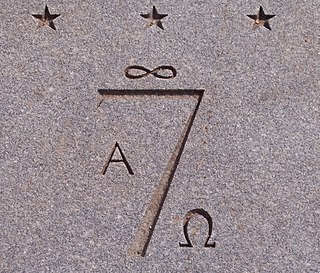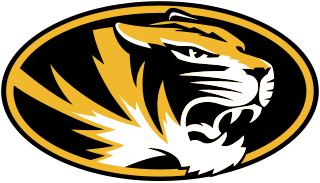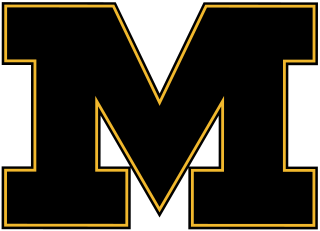
The Seven Society is the most secretive of the University of Virginia's secret societies. Members are only revealed after their death, when a wreath of black magnolias in the shape of a "7" is placed at the gravesite, the bell tower of the University Chapel chimes at seven-second intervals on the seventh dissonant chord when it is seven past the hour, and a notice is published in the university's Alumni News, and often in the Cavalier Daily. The most visible tradition of the society is the painting of the logo of the society, the number 7 surrounded by the signs for alpha (A), omega (Ω), and infinity (∞), and sometimes several stars, upon many buildings around the grounds of the university.

Faurot Field at Memorial Stadium is an outdoor sports stadium in Columbia, Missouri, United States, on the campus of the University of Missouri. It is primarily used for football and serves as the home field for the Missouri Tigers' program. It is the third-largest sports facility by seating capacity in the state of Missouri, behind The Dome at America's Center in St. Louis and Arrowhead Stadium in Kansas City. In 1972, Memorial Stadium's playing surface was named Faurot Field in honor of longtime coach Don Faurot.

The Missouri Tigers intercollegiate athletics programs represent the University of Missouri, located in Columbia. The name comes from a band of armed Union Home Guards called the Fighting Tigers of Columbia who, in 1864, protected Columbia from Confederate guerrillas during the American Civil War.

QEBH is a senior honor society at the University of Missouri. Founded in 1898, it is the oldest of six recognized secret honor societies that participate in the annual tradition of Tap Day on campus. The meaning of the society's name is known only to the members.
There are many collegiate secret societies in North America. They vary greatly in their level of secrecy and the degree of independence from their universities. A collegiate secret society makes a significant effort to keep affairs, membership rolls, signs of recognition, initiation, or other aspects secret from the public.

The Missouri Tigers football program represents the University of Missouri in college football and competes in the Football Bowl Subdivision (FBS) of the National Collegiate Athletic Association (NCAA).

The Zeta Phi Society (ΖΦ) was a fraternal organization founded in 1870 at the University of Missouri. The Alpha chapter of the society became a chapter of Beta Theta Pi in 1890. The Missouri unit is the oldest fraternity in continuous existence at the university and the second fraternity founded west of the Mississippi River. Its second chapter, Sigma chapter joined Phi Gamma Delta in 1886. Zeta Phi Society's other two units disbanded.

Constructed in 1915, Elmer Ellis Library is the main library of the University of Missouri on the campus of the University of Missouri in Columbia, Missouri. It was named in 1972 for former university president Elmer Ellis. With holdings of over three million volumes and six million microforms, The University of Missouri library system has been part of the Federal Depository Library Program since 1862.

Marching Mizzou, M2, or The Big 'M' of the Midwest is the performing marching band for the University of Missouri, founded in 1885 as a college military band. Originally consisting of only 12 members, it is now the largest student organization on the MU campus, drawing students from nearly every major. Marching Mizzou performs at all home football games of the Missouri Tigers football team, in addition to other university events; and expanded Mini Mizzou travels to two away games per season, while the entire band regularly follows the team to conference championship games and bowl games. Marching Mizzou's signature drill "Flip Tigers" has been a well-known tradition of its pre-game show since 1960. It is instructed by University of Missouri School of Music faculty.
William George Muir was an American football, basketball, and baseball coach. He served as the head football coach at Northern Illinois University from 1925 to 1925, compiling a record of 11–9–3. Muir was also the head basketball coach at Northern Illinois from 1923 to 1926 and the head baseball coach at the school from 1924 to 1926. He graduated from the University of Missouri and also attended coaching school at the University of Illinois. Prior to coming to Northern Illinois, he had taught and coached in Kansas, Texas, and in Decatur, Illinois.

The University of Missouri is a public land-grant research university in Columbia, Missouri. It is Missouri's largest university and the flagship of the four-campus University of Missouri System. MU was founded in 1839 as the first public university west of the Mississippi River. It has been a member of the Association of American Universities since 1908 and is classified among "R1: Doctoral Universities – Very high research activity".

The 2010 Missouri Tigers football team represented the University of Missouri in the 2010 NCAA Division I FBS football season. The team was coached by Gary Pinkel, who returned for his tenth season with Mizzou, and played their home games at Faurot Field at Memorial Stadium. The team began the season fresh off their fifth straight bowl appearance. The team hired a new public address announcer, Randy Moehlman.

The Missouri–Oklahoma football rivalry is an American college football rivalry between the Missouri Tigers football team of the University of Missouri and Oklahoma Sooners football team of the University of Oklahoma. The Tiger–Sooner Peace Pipe was the trophy awarded to the winner of the game.
The University of Missouri College of Engineering is one of the 19 academic schools and colleges of the University of Missouri, a public land-grant research university in Columbia, Missouri. The college, also known as Mizzou Engineering, has an enrollment of 3,204 students who are enrolled in 10 bachelor’s programs, nine master’s programs and seven doctorate programs. There are six academic departments within the College: Chemical and Biomedica Engineering; Civil and Environmental Engineering; Electrical Engineering and Computer Science; Industrial and Systems Engineering; Engineering and Information Technology; and Mechanical and Aerospace Engineering. The college traces its beginning to the first engineering courses taught west of the Mississippi River in 1849. The college was ranked 88th nationally by the U.S. News & World Report in 2016.
The 2013 Missouri Tigers football team represented the University of Missouri in the 2013 NCAA Division I FBS football season. It marked the Tigers' second season as a member of the Southeastern Conference (SEC) in the Eastern Division. The team was led by head coach Gary Pinkel, in his 13th year and played its home games at Faurot Field in Columbia, Missouri. The Tigers went into the season hoping to return to a bowl game after missing out the previous season. They succeeded after an 11–1 regular season and their first-ever SEC Eastern Division title. After a loss to Auburn in the SEC Championship Game they played in the 2014 Cotton Bowl Classic on January 3, 2014, against Oklahoma State, which they won 41–31. The two teams had last met on October 22, 2011.
LSV is a senior women's honor society at the University of Missouri in Columbia, Missouri, United States.

Barry Stephen Odom is an American football coach and currently the head coach at the University of Nevada, Las Vegas. Odom previously spent 15 years with the University of Missouri football program as a player, recruiter, assistant coach, and head coach.

The Columns are the most recognizable landmark of the University of Missouri in Columbia, Missouri. Standing 43 feet (13 m) tall in the center of Francis Quadrangle and at the south end of the Avenue of the Columns, they are the remains of the portico of Academic Hall. Along with Jesse Hall, they are one of the most photographed sites in Missouri. The Columns have been at the center of many traditions and events including graduations, concerts, pranks, weddings, and protests. Mizzou's school song mentions the columns, and they have been the setting for a work of fiction. They are a contributing structure to the Francis Quadrangle National Historic District. The columns underwent preservation work in 2017.

The School of Music is an academic division of the University of Missouri in Columbia, Missouri. Its focus is the study of music, awarding baccalaureate, master's, and doctoral degrees as part of the College of Arts and Science. The institution's programs encompass composition, performance, conducting, music education, music history, musical theatre and musicology. Established in 1917 as the Department of Music, the school continues to play a prominent role in the cultural life of Missouri and is located in the Sinquefield Music Center, on the university's flagship campus in Downtown Columbia. The Fine Arts Building also houses classrooms, studios, and a recital hall. Its major performance venues are Jesse Hall, the Missouri Theatre, and Whitmore Recital Hall. The Missouri Tigers marching band, Marching Mizzou, performs at Faurot Field for Southeastern Conference football games. The school's ensembles have performed worldwide and can be heard weekly on the university's own KMUC 90.5 FM Classical, Mid-Missouri's classical music radio station. Alumni include singers Sheryl Crow and Neal Boyd, Canadian Brass founder Gene Watts, and jazz artist Mike Metheny.













